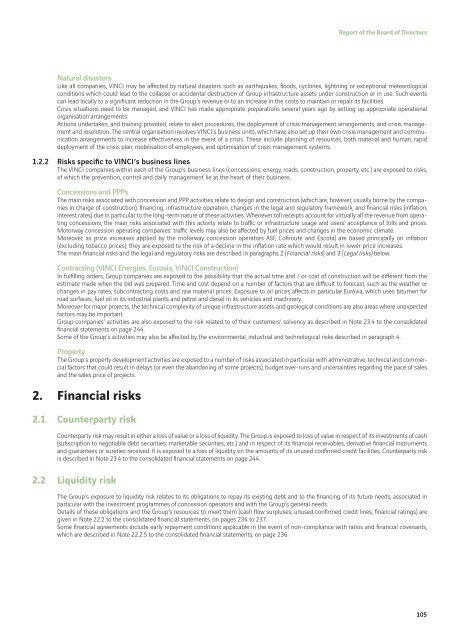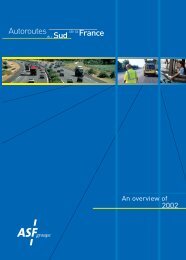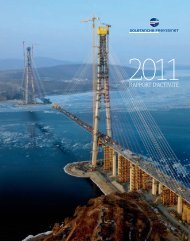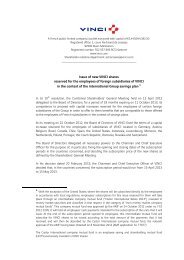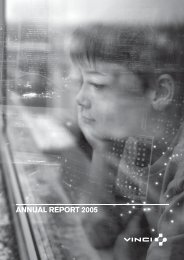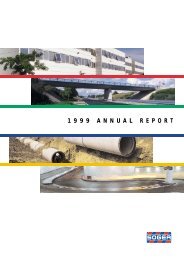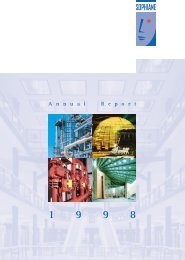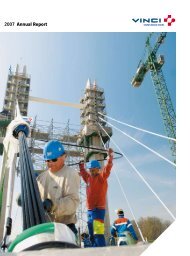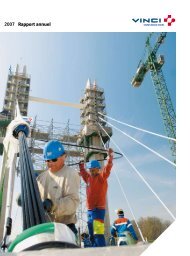VINCI - 2008 annual report
VINCI - 2008 annual report
VINCI - 2008 annual report
Create successful ePaper yourself
Turn your PDF publications into a flip-book with our unique Google optimized e-Paper software.
Report of the Board of Directors<br />
Natural disasters<br />
Like all companies, <strong>VINCI</strong> may be aff ected by natural disasters such as earthquakes, fl oods, cyclones, lightning or exceptional meteorological<br />
conditions which could lead to the collapse or accidental destruction of Group infrastructure assets under construction or in use. Such events<br />
can lead locally to a signifi cant reduction in the Group’s revenue or to an increase in the costs to maintain or repair its facilities.<br />
Crisis situations need to be managed, and <strong>VINCI</strong> has made appropriate preparations several years ago by setting up appropriate operational<br />
organisation arrangements.<br />
Actions undertaken, and training provided, relate to alert procedures, the deployment of crisis management arrangements, and crisis management<br />
and resolution. The central organisation involves <strong>VINCI</strong>’s business units, which have also set up their own crisis management and communication<br />
arrangements to increase eff ectiveness in the event of a crisis. These include planning of resources, both material and human, rapid<br />
deployment of the crisis plan, mobilisation of employees, and optimisation of crisis management systems.<br />
1.2.2 Risks specifi c to <strong>VINCI</strong>’s business lines<br />
The <strong>VINCI</strong> companies within each of the Group’s business lines (concessions, energy, roads, construction, property, etc.) are exposed to risks,<br />
of which the prevention, control and daily management lie at the heart of their business.<br />
Concessions and PPPs<br />
The main risks associated with concession and PPP activities relate to design and construction (which are, however, usually borne by the companies<br />
in charge of construction), fi nancing, infrastructure operation, changes in the legal and regulatory framework, and fi nancial risks (infl ation,<br />
interest rates) due in particular to the long-term nature of these activities. Whenever toll receipts account for virtually all the revenue from operating<br />
concessions, the main risks associated with this activity relate to traffi c or infrastructure usage and users’ acceptance of tolls and prices.<br />
Motorway concession operating companies’ traffi c levels may also be aff ected by fuel prices and changes in the economic climate.<br />
Moreover, as price increases applied by the motorway concession operators ASF, Cofi route and Escota) are based principally on infl ation<br />
(excluding tobacco prices), they are exposed to the risk of a decline in the infl ation rate which would result in lower price increases.<br />
The main fi nancial risks and the legal and regulatory risks are described in paragraphs 2 (Financial risks) and 3 (Legal risks) below.<br />
Contracting (<strong>VINCI</strong> Energies, Eurovia, <strong>VINCI</strong> Construction)<br />
In fulfi lling orders, Group companies are exposed to the possibility that the actual time and / or cost of construction will be diff erent from the<br />
estimate made when the bid was prepared. Time and cost depend on a number of factors that are diffi cult to forecast, such as the weather or<br />
changes in pay rates, subcontracting costs and raw material prices. Exposure to oil prices aff ects in particular Eurovia, which uses bitumen for<br />
road surfaces, fuel oil in its industrial plants and petrol and diesel in its vehicles and machinery.<br />
Moreover for major projects, the technical complexity of unique infrastructure assets and geological conditions are also areas where unexpected<br />
factors may be important.<br />
Group companies’ activities are also exposed to the risk related to of their customers’ solvency as described in Note 23.4 to the consolidated<br />
fi nancial statements on page 244.<br />
Some of the Group’s activities may also be aff ected by the environmental, industrial and technological risks described in paragraph 4.<br />
Property<br />
The Group’s property development activities are exposed to a number of risks associated in particular with administrative, technical and commercial<br />
factors that could result in delays (or even the abandoning of some projects), budget over-runs and uncertainties regarding the pace of sales<br />
and the sales price of projects.<br />
2. Financial risks<br />
2.1 Counterparty risk<br />
Counterparty risk may result in either a loss of value or a loss of liquidity. The Group is exposed to loss of value in respect of its investments of cash<br />
(subscription to negotiable debt securities, marketable securities, etc.) and in respect of its fi nancial receivables, derivative fi nancial instruments<br />
and guarantees or sureties received. It is exposed to a loss of liquidity on the amounts of its unused confi rmed credit facilities. Counterparty risk<br />
is described in Note 23.4 to the consolidated fi nancial statements on page 244.<br />
2.2 Liquidity risk<br />
The Group’s exposure to liquidity risk relates to its obligations to repay its existing debt and to the fi nancing of its future needs, associated in<br />
particular with the investment programmes of concession operators and with the Group’s general needs.<br />
Details of these obligations and the Group’s resources to meet them (cash fl ow surpluses, unused confi rmed credit lines, fi nancial ratings) are<br />
given in Note 22.2 to the consolidated fi nancial statements, on pages 234 to 237.<br />
Some fi nancial agreements include early repayment conditions applicable in the event of non-compliance with ratios and fi nancial covenants,<br />
which are described in Note 22.2.5 to the consolidated fi nancial statements, on page 236.<br />
105


